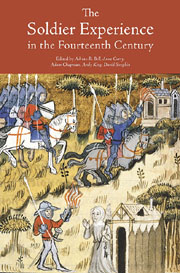Book contents
- Frontmatter
- Contents
- List of Contributors
- List of Abbreviations
- Introduction
- 1 Military Service and the Dynamics of Recruitment in Fourteenth-Century England
- 2 Total War in the Middle Ages? The Contribution of English Landed Society to the Wars of Edward I and Edward II
- 3 A Warlike People? Gentry Enthusiasm for Edward I's Scottish Campaigns, 1296–1307
- 4 Edward I's Centurions: Professional Soldiers in an Era of Militia Armies
- 5 Who's afraid of the Big Bad Bruce? Balliol Scots and ‘English Scots’ during the Second Scottish War of Independence
- 6 Rebels, Uchelwyr and Parvenus: Welsh Knights in the Fourteenth Century
- 7 Breton Soldiers from the Battle of the Thirty (26 March 1351) to Nicopolis (25 September 1396)
- 8 Towards a Rehabilitation of Froissart's Credibility: The Non Fictitious Bascot de Mauléon
- 9 The English Reversal of Fortunes in the 1370s and the Experience of Prisoners of War
- 10 The Soldier, ‘hadde he riden, no man ferre’
- Index
- Warfare in History
6 - Rebels, Uchelwyr and Parvenus: Welsh Knights in the Fourteenth Century
Published online by Cambridge University Press: 05 February 2013
- Frontmatter
- Contents
- List of Contributors
- List of Abbreviations
- Introduction
- 1 Military Service and the Dynamics of Recruitment in Fourteenth-Century England
- 2 Total War in the Middle Ages? The Contribution of English Landed Society to the Wars of Edward I and Edward II
- 3 A Warlike People? Gentry Enthusiasm for Edward I's Scottish Campaigns, 1296–1307
- 4 Edward I's Centurions: Professional Soldiers in an Era of Militia Armies
- 5 Who's afraid of the Big Bad Bruce? Balliol Scots and ‘English Scots’ during the Second Scottish War of Independence
- 6 Rebels, Uchelwyr and Parvenus: Welsh Knights in the Fourteenth Century
- 7 Breton Soldiers from the Battle of the Thirty (26 March 1351) to Nicopolis (25 September 1396)
- 8 Towards a Rehabilitation of Froissart's Credibility: The Non Fictitious Bascot de Mauléon
- 9 The English Reversal of Fortunes in the 1370s and the Experience of Prisoners of War
- 10 The Soldier, ‘hadde he riden, no man ferre’
- Index
- Warfare in History
Summary
The role of the knight in the fourteenth century is well explored, his expectations of military service are well understood, and knighthood's place in chivalric expression as a cultural phenomenon is well known. The place of the Welsh in England's wars in this period is perhaps less comprehensively understood, though a cursory glance at the campaign accounts of the first half of the century in particular reveal it to be substantial and, at times, truly extraordinary. The Shires and the March of Wales, a combat zone in the thirteenth century, became a recruitment ground for foreign wars in the fourteenth. The lands of Wales, in consequence, enjoyed an almost unprecedented century of relative peace; its men, however, knew war better than those of almost any part of England. They were rarely warriors of high status but they appear to have been generally efficient, notably loyal and, in the way of such commonplace people, largely unremarkable. If foreigners thought of the Welsh at all, however, it was as soldiers. It is advisable to review briefly the status of the Welsh as soldiers from the fall of Gwynedd in 1283. These men, regardless of their lords, fought together and were led by men familiar in their communities, drawn from either the native aristocracy or from the descendants of the Norman invaders of earlier centuries. It is from this class of men that these knights of fourteenth-century Wales emerged.
- Type
- Chapter
- Information
- The Soldier Experience in the Fourteenth Centur , pp. 145 - 156Publisher: Boydell & BrewerPrint publication year: 2011



